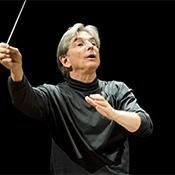Michael Tilson Thomas began a two-week stint with the Los Angeles Philharmonic this past weekend with performances of his own Four Preludes on Playthings of the Wind and Tchaikovsky’s Symphony No. 6 in B minor, Op. 74 (“Pathétique”) at Walt Disney Concert Hall.
Tilson Thomas originally composed Four Preludes in 2003, and then revised it in 2015-2016. The Preludes, played without pause, are based on a 1922 poem of the same name by Carl Sandburg. Sandburg’s poem was written when the country (and the world) was still reeling from “the great war” (World War I). The main theme is the transience of all things, including great cities and great nations. Tilson Thomas thinks the message is as relevant, if not more so, in today’s world, which is the sentiment he expresses in his Four Preludes.
The orchestration includes a small chamber-sized orchestra and a “bar band” with two electric guitars, bass, drums, keyboard, two saxophones and a trombone (the orchestra included a bass trombone as well). The point of the bar band was to express the sounds of a modern American city.
On Sunday, the poem was sung brilliantly by the soprano Measha Brueggergosman who was backed up by the expert singing of Mikaela Bennett and Kara Dugan, all of whom were dressed in sparkling gold sequin dresses. Their movements on stage reminded one of the Supremes. The entire effect was one of a collage of symphonic music, pop music and rhythms and an all-girl trio. Tilson Thomas’ composition did justice to the dark message in Sandburg’s poem, and it was exciting to hear an electric lead guitar taking solo turns with traditional orchestral instruments.
The second half of the concert could not have been any more different than the first half, except for the fact that Tchaikovsky’s final symphony could be interpreted as a “requiem not only for Tchaikovsky, but also for Imperial Russia,” as the program notes indicated. Everything, even great empires, are temporary. Perhaps, then, it was no accident that Tilson Thomas paired the two.
The merit of this hypothesis is supported possibly by the way that Tilson Thomas interpreted Tchaikovsky’s symphony, with long drawn-out lines and emphatic pauses that, even though Tchaikovsky inserted the markings for them in the score, were accentuated by Tilson Thomas. The result was an even more personal and impassioned rendering, even in the raucous march-like third movement, the end of which never fails to evoke applause. Tilson Thomas led the audience through the emotional highs and lows of a symphony that Tchaikovsky not only considered his most beloved musical composition, but in a way, became his own epitaph (he died nine days after he conducted the premiere in 1893).
Tilson Thomas continues his LA Phil engagement on Dec. 7, 8, and 9 with concerts featuring more works by Tchaikovsky (Romeo and Juliet Overture-Fantasy and Variations on a Rococo Theme, Op. 33 with the French cellist Gautier Capuçon) as well as Charles Ives’ A Symphony: New England Holidays.
—Henry Schlinger, Culture Spot LA
Visit www.laphil.com.






